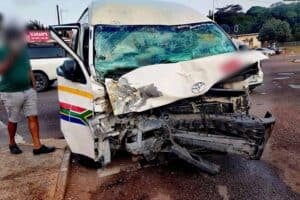Eleven worshippers gunned-down in a Nigerian church funded by a man accused by some of being a drug lord and described by others as a philanthropist may be victims of "gang war".
Just hours after the slaughter at the Sunday mass in St Philip’s in the Ozubulu area of southeastern Anambra state, detectives linked the killings to local mafia-style syndicates that have influence well beyond Nigeria’s shores.
“Information revealed that this is not unconnected to a kind of a ‘gang war’ between the children of the same village who are engaged in a warfare outside Nigeria,” said Anambra state police commissioner Garba Umar, referring to South Africa.
Death threats had reportedly been made against the apparent target Aloysius Nnamdi Ikegwuonu, a wealthy young philanthropist who has been accused by some in the Nigerian media of involvement in the criminal underworld.
Such is Ikegwuonu’s wealth that he had built roads and schools for the community and even appeared on advertising posters proclaiming his “humanitarian projects”.
But on Sunday he was not in the church he had funded so lavishly, even donating three cars to new preachers, according to a local resident.
“The attackers went to the church where their target was supposed to be and started shooting at the crowd,” said Umar, who put the death toll at 11, while witnesses say that as many as 20 parishioners could have been killed.
– ‘Violence as a last resort’ –
The gunman or gunmen — the number of attackers is disputed — then turned their weapons on Ikegwuonu’s father and the congregation in frustration at failing to locate their target.
The trigger for such apparently random bloodshed may have been pulled in South Africa’s sprawling commercial capital Johannesburg which is home to many thousands of Nigerians.
Speaking to the Nation newspaper, a spokesman for Ikegwuonwu denied commissioner Umar’s claim that “the mayhem was as a result of a drug war”.
The spokesman described allegations that Ikegwuonwu was involved in the drug trade as “evil and malicious” to the Punch newspaper.
But AFP has received testimony of a feud between him and a man called Obreche — who is understood to be from the same state as Ikegwuonu, nicknamed Bishop.
According to the account, Obreche treated Ikegwuonu like a son and helped him with his commercial activities in Johannesburg.
But the bishop is alleged to have feared competition from Obreche and his affiliates, turning on the man and his organisation in 2013.
Anambra state governor Willie Obiano said in a statement on Monday he had been briefed that “this dangerous conflict has been going on for a while in the country where they both live” — but did not name the men.
“We are dealing with a dangerous gang war that has spilled over to Anambra state,” he said.
Valentina Pancieri, a researcher in the criminology department at the University of Cape Town, described such violence as “very, very rare”.
“Nigerian syndicates don’t usually compete against each other and, unlike the Italian, Russian or Mexican mafia, they use violence as a last resort because they don’t want attention to be drawn to them in foreign countries,” she told AFP.
Nigerian police said on Tuesday that they had made arrests in connection with the incident without disclosing the identities of those held or how many people had been detained.
“There is a high possibility that innocent members of the public are being arrested… while the real culprits possibly hide,” said Emeka Umeagbalasi, an activist with campaign group Intersociety which called for outside scrutiny of the Anambra state police investigation.
In 2016, the church posted on Facebook that “no weapon formed or fashioned against Chief Aloysius Nnamdi Ikegwuonu shall ever prosper in Jesus’ name”.
For now, the ‘Bishop’ remains in play.






